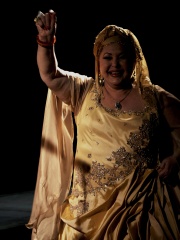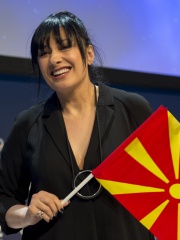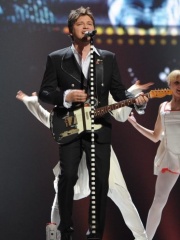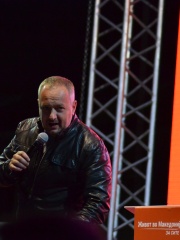







The Most Famous
SINGERS from North Macedonia
This page contains a list of the greatest Macedonian Singers. The pantheon dataset contains 4,381 Singers, 19 of which were born in North Macedonia. This makes North Macedonia the birth place of the 48th most number of Singers behind Georgia, and Puerto Rico.
Top 10
The following people are considered by Pantheon to be the top 10 most legendary Macedonian Singers of all time. This list of famous Macedonian Singers is sorted by HPI (Historical Popularity Index), a metric that aggregates information on a biography's online popularity. Visit the rankings page to view the entire list of Macedonian Singers.

1. Esma Redžepova (1943 - 2016)
With an HPI of 69.71, Esma Redžepova is the most famous Macedonian Singer. Her biography has been translated into 43 different languages on wikipedia.
Esma Redžepova-Teodosievska (Macedonian: Есма Реџепова-Теодосиевска, pronounced [ˈɛsma rɛˈd͡ʒɛpɔva tɛɔdɔˈsiɛfska]; 8 August 1943 – 11 December 2016) was a Macedonian Romani vocalist, songwriter and humanitarian. She was nicknamed "the Queen of the Gypsies" per her contribution to Romani culture and music. She started to sing while she was a teenager in the 1950s, and her career spans over five decades. Her musical success was closely linked to her marriage with Stevo Teodosievski, who was a composer, arranger and director of a musical ensemble Ansambl Teodosievski. He wrote many of her songs and fully managed her career until his death in 1997. Her musical style was mostly inspired by traditional Romani and Macedonian music. Some other influences are also noticeable, such as pop music. Esma Redžepova started her career at a period when Romani music was very denigrated in Yugoslavia and Romani people considered it shameful for women to sing in public. Redžepova was one of the first singers to sing in Romani language on radio and television. Redžepova was particularly noted for her powerful and emotional voice. In 2010, she was cited among the 50 Great Voices in the world by NPR. Redžepova was also noted for her extravagant attires and her turbans, as well as the use she made of typical stereotypes about Romani women, such as sensuality and happiness. In 2010, she was awarded the Macedonian Order of Merit; and in 2013, she was named National Artist of the Republic of Macedonia by President of Macedonia Gjorge Ivanov. With her husband Stevo Teodosievski, she fostered 47 children and received numerous accolades for her humanitarian work. She supported Roma and women rights and was also involved in local politics in her hometown of Skopje. Together with Vlatko Lozanoski, she represented Macedonia in the Eurovision Song Contest 2013 in Malmö, Sweden. Initially, they were supposed to sing the song "Imperija"; however, that song caused controversy, so a new song, "Pred da se razdeni", was chosen, with which they participated in Sweden. They participated in the second semi-final of the competition on 16 May 2013, placing 16th in the field of 17 songs, scoring 28 points and thus failing to qualify to the final on 18 May. She died on 11 December 2016 after a short illness.

2. Kaliopi (b. 1966)
With an HPI of 62.64, Kaliopi is the 2nd most famous Macedonian Singer. Her biography has been translated into 59 different languages.
Kaliopi Bukle (Macedonian: Калиопи Букле, pronounced [kaliˈɔpi ˈbuklɛ] ; born 28 December 1966 as Kaliopi Bukleska (Macedonian: Калиопи Буклеска)), known professionally as Kaliopi, is a Macedonian singer-songwriter. In her career, Kaliopi has progressed from singing lead vocal with her eponymous band in 1980s Yugoslavia to being an established vocalist and composer working in North Macedonia and across former Yugoslavia. She represented Macedonia twice in the Eurovision Song Contest, first in 2012 in Baku, Azerbaijan with "Crno i belo" and a second time in 2016 in Stockholm, Sweden with the song "Dona".

3. Toše Proeski (1981 - 2007)
With an HPI of 58.90, Toše Proeski is the 3rd most famous Macedonian Singer. His biography has been translated into 48 different languages.
Todor "Toše" Proeski (Macedonian: Тодор "Тоше" Проески, pronounced [ˈtɔʃɛ ˈprɔɛski] ; 25 January 1981 – 16 October 2007) was a Macedonian singer and songwriter. Considered a top act of the local Macedonian and Balkan music scene, Proeski's music was popular across multiple countries in Southeast Europe. He was dubbed the "Elvis Presley of the Balkans" by BBC News. He died in a highway car crash in Croatia in 2007 at the age of 26, and received substantial posthumous recognition.

4. Karolina Gočeva (b. 1980)
With an HPI of 51.08, Karolina Gočeva is the 4th most famous Macedonian Singer. Her biography has been translated into 38 different languages.
Karolina Gočeva (Macedonian: Каролина Гочева, pronounced [karɔˈlina ˈɡɔtʃɛva] ; born 28 April 1980), sometimes credited as Karolina Gocheva or known only as Karolina, is a Macedonian singer. She launched her music career in 1991 with a performance at a local children's show and continued participating in the following years, receiving recognition for her talent. In 1992, she released her first children album titled Mamo, pušti me (English: Mom, let me go). She signed a contract with the record label Avalon Production in 2000. Gočeva's discography consists of a total of nine studio albums, spanning pop, R&B, rock, traditional folk and ethno, jazz and world musical styles. Shortly after signing her contract with Avalon Production, Gočeva released her debut studio album Jas Imam Pesna, which included the song "Nemir" featuring Toše Proeski. Her second, third, and fourth studio albums Zošto Sonot Ima Kraj, Znaeš Kolku Vredam and Vo Zaborav were released in 2002, 2003, and 2005, respectively. While her initial five albums were more pop, R&B and rock-oriented, her later records Makedonsko Devojče (English: Macedonian Girl) (2008), Makedonsko Devojče 2 (2014) and Izvor (English: Spring) (2018) incorporated elements of Macedonian traditional music and jazz. This switch in sound led to increased popularity, wide acclaim from the public, and sold-out concerts in North Macedonia, Serbia, and Bulgaria. Her ninth studio album, in collaboration with Duke Bojadziev and Ismail Lumanovski, Pesni za Ljubov i Kopnež, was released on 24 December 2022. An upcoming studio album with a more pop sound preceded by singles "Od nebo do dno" and "Daj na sunce" is scheduled for release at the end of 2024. She represented Macedonia in the Eurovision Song Contests 2002 and 2007, ranking 19th and 14th, respectively. Gočeva has received numerous awards and accolades both in North Macedonia as well as other Balkan award ceremonies. She is widely known as the most famous Macedonian female pop singer and has received the label "Macedonian pop princess/queen" and a "pop diva". Although most of her songs are sung in Macedonian, Gočeva has also released records in Serbo-Croatian and English leading to an increase in popularity in Bulgaria and ex-Yugoslav countries such as Serbia, Bosnia and Herzegovina, Montenegro, and Croatia. Additionally, Gočeva is renowned for her casual fashion style for which she frequently collaborates with Caci Pakoska. With her music work, Gočeva has also taken part in campaigns against drug use, uterine cancer and gender-related violence.

5. Tijana Dapčević (b. 1976)
With an HPI of 50.74, Tijana Dapčević is the 5th most famous Macedonian Singer. Her biography has been translated into 32 different languages.
Tijana Dapčević (née Todevska; Macedonian: Тијана Дапчевиќ, née Тодевска, Serbian Cyrillic: Тијана Дапчевић, née Тодевска, pronounced [tǐjana dâptʃeʋitɕ]; born 3 February 1976) is a Macedonian and Serbian singer.

6. Vlado Janevski (b. 1960)
With an HPI of 49.94, Vlado Janevski is the 6th most famous Macedonian Singer. His biography has been translated into 21 different languages.
Vladimir Vlado Janevski (Macedonian: Владимир Владо Јаневски [ˈvlaːdɔ ˈjanɛfski] born 27 November 1960) is a Macedonian singer. He was North Macedonia's first Eurovision contestant, finishing 19th in Birmingham at the 1998 Eurovision Song Contest with the song "Ne Zori, Zoro".

7. Tamara Todevska (b. 1985)
With an HPI of 46.59, Tamara Todevska is the 7th most famous Macedonian Singer. Her biography has been translated into 38 different languages.
Tamara Todevska (Macedonian: Тамара Тодевска, pronounced [ˈtamara ˈtɔdɛvska] , born 1 June 1985), known professionally as Tamara, is a Macedonian singer. She has represented North Macedonia in the Eurovision Song Contest on two occasions; in 2008, she performed the song "Let Me Love You" with Vrčak and Adrian Gaxha and failed to qualify for the final, performing, and in 2019, she placed seventh in the final with the song "Proud", earning North Macedonia its best-ever result in the contest. Tamara began her music career in 2003 following the release of her debut studio album Sino. She has won on various music competitions throughout her career such as MAKFest in 2006 and Skopje Fest in 2007. Todevska is the younger sister of singer Tijana Dapčević, and they have collaborated several times.

8. Vlatko Ilievski (1985 - 2018)
With an HPI of 44.16, Vlatko Ilievski is the 8th most famous Macedonian Singer. His biography has been translated into 25 different languages.
Vlatko Ilievski (Macedonian: Влатко Илиевски; 2 July 1985 – 6 July 2018) was a Macedonian pop rock singer and actor. He was the runner-up to be the Macedonian entry for the Eurovision Song Contest 2010 and represented FYR Macedonia in the Eurovision Song Contest 2011 with the song "Rusinka" in Düsseldorf, Germany. He was previously a member of the rock band "Moral". He was a student of acting at the Faculty of Dramatic Arts, Skopje, where he graduated in 2010 with the drama "Anger" from Stephen King (The Rage).

9. Elena Risteska (b. 1986)
With an HPI of 44.14, Elena Risteska is the 9th most famous Macedonian Singer. Her biography has been translated into 30 different languages.
Elena Risteska (Macedonian: Елена Ристеска, [ɛ'lɛna ri'stɛska] ; born 27 April 1986), sometimes known as simply Elena, is a Macedonian singer. She represented Macedonia in the Eurovision Song Contest 2006 in Athens with the song "Ninanajna", and finished in 12th place; this was the highest ever finish for the country until Risteska's record was beaten in 2019. Risteska is also an occasional songwriter, writing for artists such as 4Play, Lambe Alabakoski, and Aleksandra Pileva. She took part in the second season of the Serbian version of Your Face Sounds Familiar, where she placed second in the final as Beyoncé.

10. Daniel Kajmakoski (b. 1983)
With an HPI of 44.10, Daniel Kajmakoski is the 10th most famous Macedonian Singer. His biography has been translated into 27 different languages.
Daniel Kajmakoski-Gragevinac (Macedonian: Даниел Кајмакоски-Граѓевинац, born 17 October 1983) is a Macedonian singer and songwriter. He is best known for having won the first series of X Factor Adria. He represented Macedonia in the Eurovision Song Contest 2015 in Vienna, Austria with the song "Autumn Leaves" after winning the Skopje Festival 2014.
People
Pantheon has 19 people classified as Macedonian singers born between 1943 and 2000. Of these 19, 16 (84.21%) of them are still alive today. The most famous living Macedonian singers include Kaliopi, Karolina Gočeva, and Tijana Dapčević. The most famous deceased Macedonian singers include Esma Redžepova, Toše Proeski, and Vlatko Ilievski. As of April 2024, 1 new Macedonian singers have been added to Pantheon including Mesut Kurtis.
Living Macedonian Singers
Go to all RankingsKaliopi
1966 - Present
HPI: 62.64
Karolina Gočeva
1980 - Present
HPI: 51.08
Tijana Dapčević
1976 - Present
HPI: 50.74
Vlado Janevski
1960 - Present
HPI: 49.94
Tamara Todevska
1985 - Present
HPI: 46.59
Elena Risteska
1986 - Present
HPI: 44.14
Daniel Kajmakoski
1983 - Present
HPI: 44.10
Vasil Garvanliev
1984 - Present
HPI: 43.72
Gjoko Taneski
1977 - Present
HPI: 43.47
Andrea Koevska
2000 - Present
HPI: 42.93
Jana Burčeska
1993 - Present
HPI: 42.08
Mesut Kurtis
1981 - Present
HPI: 41.97
Deceased Macedonian Singers
Go to all RankingsEsma Redžepova
1943 - 2016
HPI: 69.71
Toše Proeski
1981 - 2007
HPI: 58.90
Vlatko Ilievski
1985 - 2018
HPI: 44.16
Newly Added Macedonian Singers (2025)
Go to all RankingsOverlapping Lives
Which Singers were alive at the same time? This visualization shows the lifespans of the 3 most globally memorable Singers since 1700.






